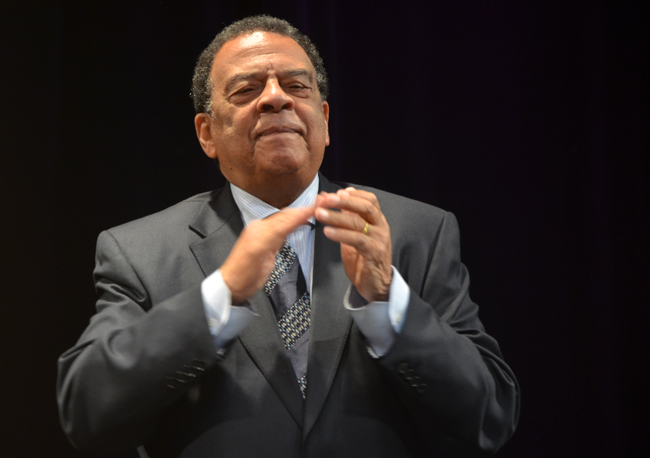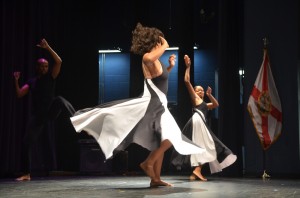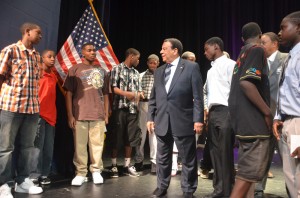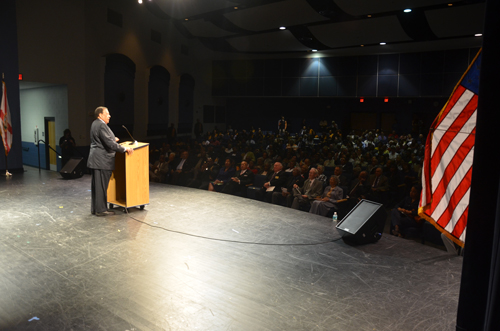
There aren’t very many eminent men left who can make jokes about the Chinese or the Japanese or Arabs or Ivy League schools or the world of business, all in almost the same breath, and still circle around to a point intended not only to defer to the importance of such diversities but to understand them for who and what they are. Or to make an even larger point: that there aren’t very many men who can hold the world together with that understanding, though one is serving in the White House now.
Neither are there very many eminent men left who can claim to have been among the founding fathers of the civil rights movement, as Andrew Young can, to have served in Congress and as the American Ambassador to the United Nations for a combined eight years, as Atlanta’s mayor for another eight and as chairman of that city’s Olympics in 1996, as Young can—and to still manage, a few months shy of 80, to bring a crowd to its feet, as Young did Sunday afternoon at Matanzas High School’s Pirates Theater, with his optimism, his impolitic jokes, the verbal memorabilia of his days with Martin Luther King, and his enduring belief in American pragmatism and the power of non-violence.
Andrew Young’s Complete Talk[media id=257 width=350 height=250]
Young was the keynote speaker at the African American Cultural Society’s 20th anniversary celebration, which the society had been celebrating for the past two weeks. Today’s 40-minute appearance by Young was the culmination. Society member Vivian Richardson had suggested Young to the society board several months ago, and the board went for it (though Young’s speaking fee is likely not cheap), with an immediate reward from Young’s first words on stage, which he spoke as he literally danced and clapped his way to the podium as dozens of the Community Ecumenical Choir’s singers were exiting: “You all do a very good job of sustaining, maintaining and advancing African-American culture.”
The choir had also brought the crowd to its feet, not least with a take-off from Handel’s Alleluia, after a quartet of dancers from Winter Park’s Center for Contemporary Dance had soared across the stage with a few African evocations of its own.
And all that, of course, emceed with John Winston’s usual baritone, had been just the warm-up to Young, who came out commanding the stage like an old habitué, without notes, with as much verve as the acts that had preceded him, plus a sort of triumphal humor that has seen it all—from growing up next to Hitler sympathizers in New Orleans to coping with the violence of the 1950s and 60s—which he shrugged off, with hyperbole, as little more than the violence of some rowdy football crowds, and called “the best days of my life. They not only set me free but set Atlanta free, Florida free, Mississippi free.”

Young is best known for having literally walked with Martin Luther King and served with him, setting strategy and negotiating with various pressure groups, not least business groups that King assigned him to because, in King’s words, Young was used to talking to white folks. Young told the story of the Birmingham Boycotts, when blacks decided no longer to patronize white businesses. That was the turning point, Young said, against which Bull Connor’s dogs or Alabama’s racist laws could do nothing. Some 100 businesses decided then to oppose institutional racism. It was a matter of pragmatism, of business survival. “When 100 businessmen decide that something is morally wrong and decide they want to do something about it, they can change society,” Young said. “That’s what happened in the south, that’s why non-violence works.”
King’s aims had been threefold: countering racism, countering wars, and countering poverty. He was successful at two of the three, Young said. “One place we haven’t made enough progress is in ending poverty,” he said, “but we have to kind of say we made progress, because when we drive around here and we think not only how we grew up, but especially how our parents and grandparents grew up, we made a whole lot of progress.” That drew some cheers.
Young frequently returned to the theme of poverty—if there was a theme to his talk—but the key to his talk was what his talks have tended always to focus on: the importance of understanding The Other’s culture—whether a neighbor’s or a rival’s across the globe—and the importance always to keep the dialogue going, no matter the enmity. That has been one of Young’s abiding beliefs. It was also the very same belief that cost him his job at the United Nations when, in August 1979, he held unauthorized talks with a representative of the Palestine Liberation Organization. “I really don’t feel a bit sorry for a thing I’ve done,” he said characteristically at the time. “I have tried to interpret to our country some of the mood of the rest of the world.” But a congressional uproar inspired by the usual ideological fealties to Israel and led by the late Robert C. Byrd proved too much. Sunday, Young spoke in similar terms of the importance of speaking to Iran, North Korea and Cuba, three nations on America’s no-call list.
Young likes to tell his stories in concentric circles, beginning in one place, curving to another, seemingly unrelated place, and maybe yet another, only to circle back to his main point. He had a few Sunday, not least the one he left for last, a subtle endorsement of the Obama presidency without as yet speaking of it in so many words, and only by way of relating it to all the other points he’d made until then about non-violence, keeping communications lines open and seeking to understand those who may at first seem alien.

“First let me say this is a non-partisan speech, and yet nobody really has a sense of what’s going on in this world,” he began, 30 minutes into his talk and a few minutes from the end. The rest is worth following almost word for word, politically incorrect jokes included.
“I went to San Francisco and I wanted to buy my wife one of those little fancy dresses, you know, slit up the side, because she was fine and I wanted to show her off,” Young said, to the crowd’s roars. “To let her know that even in San Francisco I was thinking about her. I went into this Chinese store, and I picked a dress, and it wasn’t but about $30, silk. Things were cheap in China back then. And then the lady went back through a bamboo curtain to get the right size. And I broke out into a cold sweat, and I ran out of the store. I couldn’t figure out what was the matter, what happened to me. Then I realized, all my life, the only experience I had with the Chinese was going to see Charlie Chan Fu Manchu movies where they’re always reaching out from behind a bamboo curtain to strangle somebody, put them on a slow boat to China. Now I have business college and seminary and lived all over the world but I was scared of Chinese. And it wasn’t a rational thing. When I finished, I realized how stupid it was. Now, I’ve seen white people act like that when they get in a room full of black people.
“And I have seen people get in a room with the Japanese and start negotiating. You know why we never could get a fair deal with the Japanese? We didn’t know them. We didn’t understand them. And forgive me for saying this. Forgive me. But when a Japanese businessman bows and says, ah-so, ah-so, he doesn’t mean I agree with you.” He pauses as the theater erupts with laughter again. “I can’t say it. Now, dealing with the Chinese is the same way. Going into an Arab tent and they start pouring you this funny tea, and you get discombobulated if you’re not comfortable.
“So the only person who can make sense of this world comfortably—his daddy was an African, his Momma was a white protestant from the Midwest. His daddy was a dog and left his momma. She went on to Indonesia, the largest Muslim nation in the world, populated by Chinese Muslims, and she married a Chinese Muslim, so between 6 and 10, he was in a Chinese family, and probably speaks a little Chinese, he’s got two Chinese half-sisters, so he’s not going to run when he gets in a room full of Chinese, he’s not going to panic when he gets in a room full of Africans, and he’s got more European education than any president we’ve ever had.” Young never mentioned Obama’s name. He didn’t have to. He went on: “Only thing missing, and it hurts him, he didn’t come south to school, he should have come here at FAMU, Bethune-Cookman.” Young was wildly cheered for that one. “I always tell our kids, when you get these scholarships to these rich white schools, go take them, but at least take one semester in an HBCU,” young said, referring to historically black colleges and universities. “And I know when you go to these big fancy schools, and they offer you jobs in business and industry and Wall Street and banks, sometimes, come home and work in a McDonald’s. Or a Chick-fil-A or Popeyes or something where you can get to deal with real folks. If you want a business education with bad folks, evil, complaining, get to work late, leaving early—that’s what it takes to learn a business. You’ll learn all that in one summer, you don’t have to go to Harvard. What I’m saying is, it’s a complicated process to end poverty.”
And it was back to his original theme, but with a touch of hopeful realism: 4 million Africans had been shipped in as slaves until the 19th century, Young said. Five million Africans have come to the United States voluntarily since the 1970s, and many are now returning to their countries in hopes of improving them.”
“It’s only as we get democracy and free enterprise working together in a fair and creative and ingenious way that produces people like Bill gates and Steve Jobs,” Young concluded, “but also Fred Shuttlesworth and Martin Luther King. That’s what makes America great. That’s the heritage that you celebrate.”






























Layla says
This man truly is bipartisan. He is a man of the people. He would never attempt to divide this nation as some have. How truly fortunate you were to have heard him speak.
An ex democrat says
I was there at Matanzas today. I thought Andrew Young gave a fantastic speech. It resonated and made great sense 4 years ago when Barack Obama made the same case during his first run for the presidency. Unfortunately President Obama has turned out to be worse than George Bush – doubly worse because he has demolished any legitimate claims to opposition from the democrats to anything the next Republican President will do.. Civil Liberties – forget about it – Obama has doubled down on the so called “patriot act” and tried to prosecute more than any previous administration the journalists and so-called whistleblowers (citizens who are appalled by what the government is doing behind our back). No wonder that Cheney and Bush want an apologiy for what he promised to do on the 2008 campaign. Stop the wars? well thats a joke, I’m surprised the Nobel committee hasn’t rescinded the award they gave him prematurely. Obama has opened up more wars without congress approval than any previous president. In Yemen he is deciding to kill all sorts of people, including kids,even including 16 year old american citizens without any due process under the constitution. King George of the england would have loved to have these powers. The Constitution was supposed to prevent this.
Andrew Young made a powerful argument that the civil rights movement succeded because it adopted non-violence as its key strategy. I agree with him on that. But it ask why is that not the right way for the United States to achieve its strategy in the world?
He made another point that perhaps answers that question. In the US it was the business community that decided that segregation was against their interest. Blacks were consumers as much as whitre people and boycotts by blacks hurt business. So Andrew Young was able to persuade White business owners to end the segregation.
In the Middle East, although the injustice may be similar or even worse, the American Business community does not have the same interests. Instead they are led by the Businesses that have interests in perpetuating an indefinite war selling armaments and security systems.
S Robinson says
Thank you for the great article. It was a pleasure attending this great program. Kudos to the African American Cultural Society, Inc.
Jim Guines says
Excellent article, a job well done, it makes it look like the comment made above by The Ex Democrat was at another meeting.